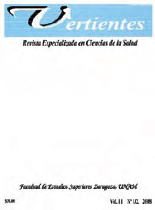Feeding practices by older women in an urban population and perception about obesity and health
Main Article Content
Abstract
It is important to know the feeding practices and perception about obesity and its relationship to health impact in a community of older women in an urban area. The first phase of this study was conducted in 111 women from a population older than 60 years on Delegation Gustavo A. Madero. This anthropometric study assessed the nutritional status with body mass index (BMI), waist (CI) and waist-hip ratio (CC) using the standards proposed by the World Health Organization (WHO) and the Mexican Standard Official (NOM). We applied a questionnaire measuring feeding attitudes, and 24 hour recalls. In the second stage six women were selected in which a semistructured interview, exploring the personal health practices, family and habits and dietary preferences. Research was conducted about knowledge and perception of obesity, its manifestations and consequences related to chronic diseases. The sessions were recorded and the interviews repeated several times to properly transcribe the information for analysis according to the research.The nutritional status was normal 24.2%, 42.9% were overweight and 32.2% obese, the results of the waist-hip ratio, 28.6% normal and 71.4% at risk for android fat deposit and central obesity was presented at a 58%. There is a high prevalence of overweight and obesity but the real causes of this weight gain are not know. Today the media promote obesity as a bad health habit, consequently there is information about this health problem, however it is not considered a disease and therefore people is not aware of the consequences, if they are chronic, the determinants, effects and complications that can generate. Obesity is directly associated with motherhood, when they married and had children and the current perception of body image is different from real. The type of diet that they and their families consume is based on cereals and animal products, there is an imbalance in the ideal energy balance. The purpose of eating is to satisfy their need of hunger and appetite, but not nutrition. These dietary practices are not only repetitive and mechanical habits, but also due to a consequence of cultural behaviors and food availability, since most of them live under non-favorable social conditions unable to meet their real health needs. The become fully aware about the relationship of feeding practices and the determinants of obesity and its health consequences is a major challenge for health workers, the power to build bridges between the biomedical and sociocultural practices that may bring health benefits.
Article Details
How to Cite
Ponce López, M. L., & Rivera Márquez, A. (2011). Feeding practices by older women in an urban population and perception about obesity and health. Vertientes. Revista Especializada En Ciencias De La Salud, 12(1-2). Retrieved from https://journals.unam.mx/index.php/vertientes/article/view/26716
Citas en Dimensions Service

Vertientes by Universidad Nacional Autónoma de México is licensed under a Creative Commons Reconocimiento-NoComercial-SinObraDerivada 4.0 Internacional License.
Creado a partir de la obra en http://www.zaragoza.unam.mx.

